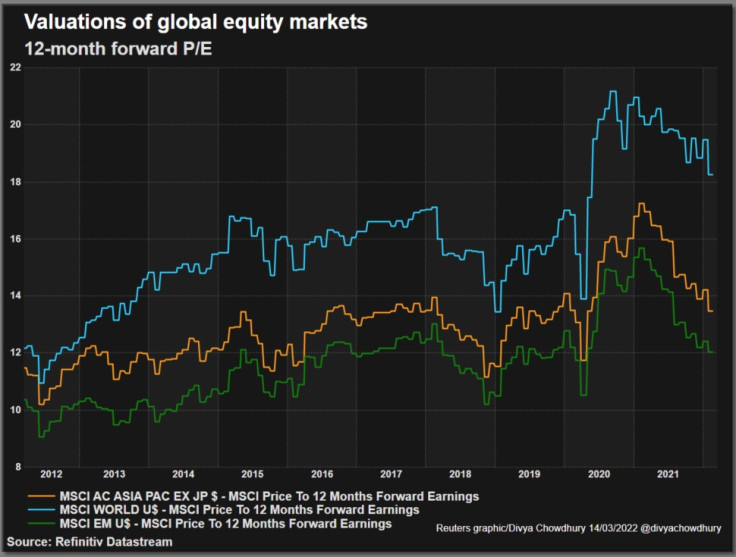Shares Fall As War, COVID And Rate Rises Batter Confidence

Stock markets fell again on Tuesday as a combination of rising COVID-19 cases in China, the war in Ukraine and worries about the Federal Reserve raising interest rates this week for the first time since 2018 all knocked investor confidence.
Oil prices tumbled more than 5%, with Brent crude back at $100 a barrel on concerns about demand from China after the country put some areas into lockdown to fight the spread of COVID-19. The prospect of talks between Russia and Ukraine reaching some kind of resolution, even if unlikely for now, also eased immediate concerns about energy supply disruption.
European stocks had been rebounding in recent sessions but they remain down sharply in 2022.
In the United States, another sharp drop left the Nasdaq 100 now down more than 20% from its record peak late last year. Wall Street futures pointed to more pain at the open.
By 0835 GMT, the Euro STOXX was 1.6% weaker, France's CAC 40 was down 1.5%, Britain's FTSE was 1.4% lower.
A lack of major progress in Ukraine-Russia talks on Monday added to the nervousness while concerns are now growing about the potential for new tensions between China and the United States.
The MSCI World Index shed 0.6% and flirted with one-year lows.
Washington has warned Beijing against providing military or financial help to Moscow after Russia's invasion of Ukraine.
"The question we are asking is whether the markets have reached peak bearishness," said Jack Siu, Credit Suisse's chief investment officer for Greater China.
"We know there has been a lot of bad news, there could be worse to come, stock prices have fallen substantially and there is no clarity on any resolutions from U.S. regulators towards Chinese-listed stocks there."
MSCI's broadest index of Asia-Pacific shares outside Japan fell 2.92%, led by pronounced weakness in Chinese stocks. The index is down 11% so far this month.
Graphic: MSCI Asia ex-Japan vs. MSCI World valuations:

Hong Kong's Hang Seng Index remained mired in negative territory on Tuesday, dropping 5.8% following an almost 5% selloff a day earlier. Hong Kong's main board is down 19% so far in March -- the index has not fallen so heavily in a month since 2008.
The city's tech index has been hammered, falling 32% this month as investors worry about the next regulatory crackdown from U.S. and Chinese authorities on the sector.
ATTENTION TURNS TO THE FED
Adding to market jitters are rising case numbers of COVID-19 in China, which investors fear will hurt the mainland's economic growth in the first quarter.
China on Tuesday reported 3,602 new confirmed coronavirus cases, compared with 1,437 on Monday..
Brent crude fell 5.76% to $100.74 per barrel, while U.S. crude tumbled 5.5% to $97.25 a barrel. Crude prices had topped $130 a barrel only last week as investors fretted about a shortage of supplies worsened by sanctions against Russia after it invaded Ukraine.
Investor focus is also on the U.S Federal Reserve, which meets on Wednesday and is expected to lift interest rates for the first time in three years to offset rising inflation.
All eyes are on whether the Fed pushes a hawkish line and a commitment to keep raising until inflation is under control.
"We are not convinced by the ultra-hawkish arguments, but the FOMC may not be willing to consider dovish scenarios without clear signs of slowing economic growth," said Steve Englander, global G10 FX research head at Standard Chartered.
"We think lagging real wages and falling disposable income will lead to a pause after July, but doubt the FOMC is ready to consider that case just yet."
The yield on the benchmark 10-year Treasury notes rose to 2.169%, the highest since mid-2019.
The two-year yield, which rises with traders' expectations of higher Fed fund rates, touched 1.894% in Asian trading, a 2-1/2 year high, before falling back to 1.833%.
The euro, which was hammered last week on concerns the war in Ukraine would hurt the regional economy, rebounded and was last up 0.7% at $1.101. The dollar index fell 0.4%.
Gold prices slipped 1% to $1,930.
© Copyright Thomson Reuters 2024. All rights reserved.





















